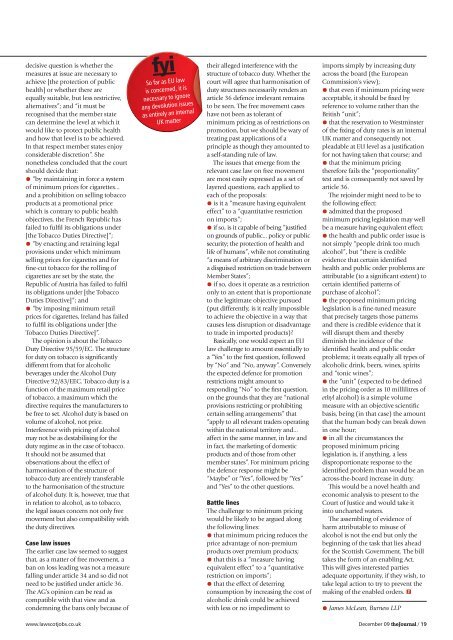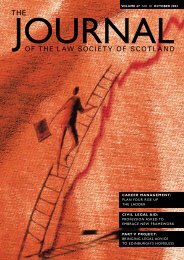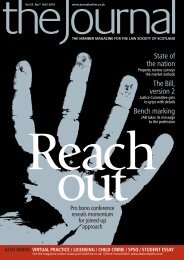Professional briefing - The Journal Online
Professional briefing - The Journal Online
Professional briefing - The Journal Online
You also want an ePaper? Increase the reach of your titles
YUMPU automatically turns print PDFs into web optimized ePapers that Google loves.
decisive question is whether the<br />
measures at issue are necessary to<br />
achieve [the protection of public<br />
health] or whether there are<br />
equally suitable, but less restrictive,<br />
alternatives”; and “it must be<br />
recognised that the member state<br />
can determine the level at which it<br />
would like to protect public health<br />
and how that level is to be achieved.<br />
In that respect member states enjoy<br />
considerable discretion”. She<br />
nonetheless concluded that the court<br />
should decide that:<br />
“by maintaining in force a system<br />
of minimum prices for cigarettes...<br />
and a prohibition on selling tobacco<br />
products at a promotional price<br />
which is contrary to public health<br />
objectives, the French Republic has<br />
failed to fulfil its obligations under<br />
[the Tobacco Duties Directive]”;<br />
“by enacting and retaining legal<br />
provisions under which minimum<br />
selling prices for cigarettes and for<br />
fine-cut tobacco for the rolling of<br />
cigarettes are set by the state, the<br />
Republic of Austria has failed to fulfil<br />
its obligations under [the Tobacco<br />
Duties Directive]”; and<br />
“by imposing minimum retail<br />
prices for cigarettes, Ireland has failed<br />
to fulfil its obligations under [the<br />
Tobacco Duties Directive]”.<br />
<strong>The</strong> opinion is about the Tobacco<br />
Duty Directive 95/59/EC. <strong>The</strong> structure<br />
for duty on tobacco is significantly<br />
different from that for alcoholic<br />
beverages under the Alcohol Duty<br />
Directive 92/83/EEC. Tobacco duty is a<br />
function of the maximum retail price<br />
of tobacco, a maximum which the<br />
directive requires the manufacturers to<br />
be free to set. Alcohol duty is based on<br />
volume of alcohol, not price.<br />
Interference with pricing of alcohol<br />
may not be as destabilising for the<br />
duty regime as in the case of tobacco.<br />
It should not be assumed that<br />
observations about the effect of<br />
harmonisation of the structure of<br />
tobacco duty are entirely transferable<br />
to the harmonisation of the structure<br />
of alcohol duty. It is, however, true that<br />
in relation to alcohol, as to tobacco,<br />
the legal issues concern not only free<br />
movement but also compatibility with<br />
the duty directives.<br />
Case law issues<br />
<strong>The</strong> earlier case law seemed to suggest<br />
that, as a matter of free movement, a<br />
ban on loss leading was not a measure<br />
falling under article 34 and so did not<br />
need to be justified under article 36.<br />
<strong>The</strong> AG’s opinion can be read as<br />
compatible with that view and as<br />
condemning the bans only because of<br />
www.lawscotjobs.co.uk<br />
fyi<br />
So far as EU law<br />
is concerned, it is<br />
necessary to ignore<br />
any devolution issues<br />
as entirely an internal<br />
UK matter<br />
their alleged interference with the<br />
structure of tobacco duty. Whether the<br />
court will agree that harmonisation of<br />
duty structures necessarily renders an<br />
article 36 defence irrelevant remains<br />
to be seen. <strong>The</strong> free movement cases<br />
have not been as tolerant of<br />
minimum pricing as of restrictions on<br />
promotion, but we should be wary of<br />
treating past applications of a<br />
principle as though they amounted to<br />
a self-standing rule of law.<br />
<strong>The</strong> issues that emerge from the<br />
relevant case law on free movement<br />
are most easily expressed as a set of<br />
layered questions, each applied to<br />
each of the proposals:<br />
is it a “measure having equivalent<br />
effect” to a “quantitative restriction<br />
on imports”;<br />
if so, is it capable of being “justified<br />
on grounds of public... policy or public<br />
security; the protection of health and<br />
life of humans”, while not constituting<br />
“a means of arbitrary discrimination or<br />
a disguised restriction on trade between<br />
Member States”;<br />
if so, does it operate as a restriction<br />
only to an extent that is proportionate<br />
to the legitimate objective pursued<br />
(put differently, is it really impossible<br />
to achieve the objective in a way that<br />
causes less disruption or disadvantage<br />
to trade in imported products)?<br />
Basically, one would expect an EU<br />
law challenge to amount essentially to<br />
a “Yes” to the first question, followed<br />
by “No” and “No, anyway”. Conversely<br />
the expected defence for promotion<br />
restrictions might amount to<br />
responding “No” to the first question,<br />
on the grounds that they are “national<br />
provisions restricting or prohibiting<br />
certain selling arrangements” that<br />
“apply to all relevant traders operating<br />
within the national territory and...<br />
affect in the same manner, in law and<br />
in fact, the marketing of domestic<br />
products and of those from other<br />
member states”. For minimum pricing<br />
the defence response might be<br />
“Maybe” or “Yes”, followed by “Yes”<br />
and “Yes” to the other questions.<br />
Battle lines<br />
<strong>The</strong> challenge to minimum pricing<br />
would be likely to be argued along<br />
the following lines:<br />
that minimum pricing reduces the<br />
price advantage of non-premium<br />
products over premium products;<br />
that this is a “measure having<br />
equivalent effect” to a “quantitative<br />
restriction on imports”;<br />
that the effect of deterring<br />
consumption by increasing the cost of<br />
alcoholic drink could be achieved<br />
with less or no impediment to<br />
imports simply by increasing duty<br />
across the board (the European<br />
Commission’s view);<br />
that even if minimum pricing were<br />
acceptable, it should be fixed by<br />
reference to volume rather than the<br />
British “unit”;<br />
that the reservation to Westminster<br />
of the fixing of duty rates is an internal<br />
UK matter and consequently not<br />
pleadable at EU level as a justification<br />
for not having taken that course; and<br />
that the minimum pricing<br />
therefore fails the “proportionality”<br />
test and is consequently not saved by<br />
article 36.<br />
<strong>The</strong> rejoinder might need to be to<br />
the following effect:<br />
admitted that the proposed<br />
minimum pricing legislation may well<br />
be a measure having equivalent effect;<br />
the health and public order issue is<br />
not simply “people drink too much<br />
alcohol”, but “there is credible<br />
evidence that certain identified<br />
health and public order problems are<br />
attributable (to a significant extent) to<br />
certain identified patterns of<br />
purchase of alcohol”;<br />
the proposed minimum pricing<br />
legislation is a fine-tuned measure<br />
that precisely targets those patterns<br />
and there is credible evidence that it<br />
will disrupt them and thereby<br />
diminish the incidence of the<br />
identified health and public order<br />
problems; it treats equally all types of<br />
alcoholic drink, beers, wines, spirits<br />
and “tonic wines”;<br />
the “unit” (expected to be defined<br />
in the pricing order as 10 millilitres of<br />
ethyl alcohol) is a simple volume<br />
measure with an objective scientific<br />
basis, being (in that case) the amount<br />
that the human body can break down<br />
in one hour;<br />
in all the circumstances the<br />
proposed minimum pricing<br />
legislation is, if anything, a less<br />
disproportionate response to the<br />
identified problem than would be an<br />
across-the-board increase in duty.<br />
This would be a novel health and<br />
economic analysis to present to the<br />
Court of Justice and would take it<br />
into uncharted waters.<br />
<strong>The</strong> assembling of evidence of<br />
harm attributable to misuse of<br />
alcohol is not the end but only the<br />
beginning of the task that lies ahead<br />
for the Scottish Government. <strong>The</strong> bill<br />
takes the form of an enabling Act.<br />
This will gives interested parties<br />
adequate opportunity, if they wish, to<br />
take legal action to try to prevent the<br />
making of the enabled orders.<br />
James McLean, Burness LLP<br />
December 09 the<strong>Journal</strong> / 19










